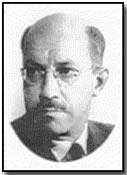Prose & Poetry - Eric Linklater
 Scottish poet,
historical writer, and the most versatile novelist of the mid-century, who
began his career as a poet.
Scottish poet,
historical writer, and the most versatile novelist of the mid-century, who
began his career as a poet.
Eric (Robert) Linklater (1899-1974) gained world fame with his cosmopolitan picarescues Juan in America (1931) and Private Angelo (1946), a comic account of post-war reorganization in Italy.
Many of his short story collections include fantasy tales.
"We have some advantages over human beings, you know. Human beings have to carry their own weight about, and they don't know how blissful it is to be unconscious of weight: to be wave-borne, to float on the idle sea, to leap without effort in a curving wave, and look up at the dazzle of the sky through a smother of white water, or dive so easily to the calmness far below and take a haddock from the weed-beds in a sudden rush of appetite." (from Sealskin Trousers, 1947)
According to some sources, Eric Linklater was born in Dournby, Orkney Islands, but it was not until in his third volume of autobiography, Fanfare for a Tin Hat, when he corrected the birth place: it is Penarth, Wales. "I have never said that I was born in Orkney, but my close connections with the islands prompted that assumption." However, Linklater regarded the islands as his spiritual home.
His father was a master mariner and the family moved back to Orkney when Linklater was very young. He attended the Intermediate School for boys and Aberdeen Grammar School. In 1916 he entered the Aberdeen University to read medicine. During World War I Linklater served as a private in the Black Watch Regiment and was wounded in the head. He continued his studies of medicine and English at Aberdeen, receiving his M.A. in 1925. From 1925 to 1927 he worked as an assistant editor of The Times of India in Bombay.
In 1928 Linklater worked as an assistant at the University of Aberdeen and then spent two years in the United States and China on a Commonwealth Fellowship. The "innocent" traveller from Juan in America continued his adventures in China in Juan in China (1937). In 1933 Linklater stood unsuccessfully as a parliamentary candidate in the East Fife by-election. Linklater was an ardent Scottish nationalist. The Lion and the Unicorn (1935), about Scotland's historical relations with England, came down in favour of Scottish autonomy.
Among Linklater's early works is the novel White-Man'S Saga (1929), an autobiographical story about a young Orcadian who attends medical school in 'Inverdoon'. The play The Devil's in the News (1929) concerns a sťance whose participants are possessed by Cromwell, Napoleon and characters from the cast of John Gay's The Beggar Opera. While in the US he wrote Poet's Pub, the first in series of his popular satirical novels. Subsequent journey to the Orient provided material for Juan in America and Juan in China. In the 1930s Linklater wrote a modern version of Aristophane's Lysistrata as The Impregnable Women (1938).
'To hell and disaster with nudism!' Juan exclaimed. 'That's the finish of it for me. I'll take off my clothes to swim and to sleep and to die and t make love, but God forsake me if ever again I undress on principle.' (from Juan in China)
During World War II Linklater commanded a fortress in the Orkneys and later worked at the public relations section of the British War Office. His experiences in Italy gave basis for the novel Private Angelo (1946), which have been compared to Jaroslav Hašek's The Good Soldier Schweik. The book was also filmed. From 1945 to 1948 he was Rector of Aberdeen University. In the 1950s Linklater travelled in the Far East, and depicted his experiences in A Year in Space (1953). His other works include juvenile tales, a non-fiction book about the Icelandic Sagas, The Ultimate Viking (1955), philosophical dialogues written for the BBC, including The Great Ship and Rabelais Replies, and a radio play.
The Pirates in the Deep Green Sea (1949), written for children, is a fantasy, in which Davy Jones and all the drowned pirates under the sea are discovered guarding the great knots that tie latitudes and longitudes together to keep the world from splitting. A Spell for Old Bones (1949) was a fantasy set in a mythical 1st-century Scotland. In A Terrible Freedom (1966) a man finds the characters of his dreams world taking over the real one. Linklater's autobiographical Fanfare for a Tin Hat appeared in 1970. Linklater died in Aberdeen on November 7, 1974. He is buried in Orkney.
Article contributed by Petri Liukkonen, website Author's Calendar.
Prevalent dysentery among Allied soldiers in Gallipoli came to be referred to as "the Gallipoli gallop".
- Did you know?
